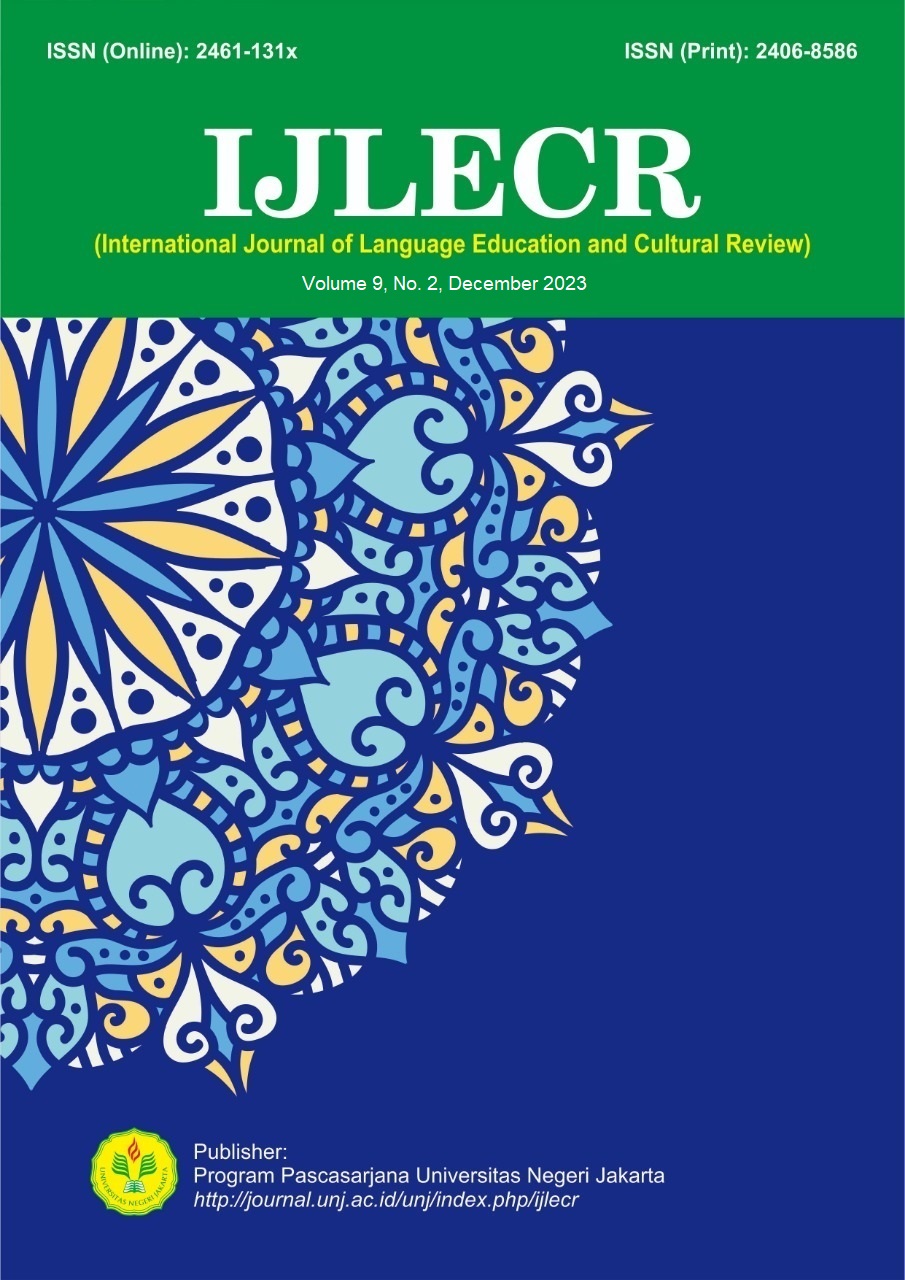Module on Writing Indonesian Procedure Text Betawi Cultural Heritage Based on Project-Based Learning
DOI:
https://doi.org/10.21009/ijlecr.v9i2.39080Keywords:
Module, Writing Indonesian Procedure Text, Betawi Cultural Heritage, Project-Based LearningAbstract
This study discusses the development of Indonesian teaching modules, especially on procedural text material among Package B students. It is known that package B students are quite different from formal schools in general because in one class students have different age gaps and initial knowledge. PKBM Negeri 10 Jakarta in particular has a learning group for students aged 12-19 years. Indonesian lesson is one of the subjects that Package B learners learn requires mastering four skills, one of which is writing. But in reality, students still have difficulty in constructing words into writing and developing ideas in the mind into written language. This research aims to create a procedure text learning module to achieve students' reading interest and the development of writing teaching materials for class VII Package B students based on project-based learning. This research starts from 2021 to September 2023. The research method used is RnD with the ADDIE method. Data collection techniques are carried out using interviews, observations, and document analysis. Making modules with the concept of ADDIE and project-based learning is carried out according to the existing stages. The module validators are experts in the fields of practitioners, languages, and design. The result of the validator's assessment of the Betawi Cultural Heritage module is very feasible, it only needs to be updated in language that is still inaccurate in language rules. This was reinforced by the results of the distribution of questionnaires that students were very satisfied and preferred the Betawi Cultural Heritage module rather than the e-module given by the teacher.
References
Aziza, L. F., & Muliansyah, A. (2020). Keterampilan berbahasa Arab dengan pendekatan komprehensif. El-Tsaqafah: Jurnal Jurusan PBA, 19(1), 56-71. https://doi.org/10.20414/tsaqafah.v19i1.2344
Froehlich, D. E., Hobusch, U., & Moeslinger, K. (2021, May). Research methods in teacher education: Meaningful engagement through service-learning. Frontiers in Education, 6(5), 178, https://www.frontiersin.org/articles/10.3389/feduc.2021.680404/full
Hall, W. (2017). The effectiveness of policy interventions for school bullying: A systematic review. Journal of the Society for Social Work and Research, 8(1), 45–69. https://doi.org/10.1086/690565
Hasibuan, T. M. (2018). Pengaruh modelprobing prompting terhadap kemampuan menyimpulkan teks prosedur pada siswa kelas vii SMP Swasta Santo Paulusmedan Labuhan tahun ajaran 2018/2019. http://repository.uhn.ac.id/handle/123456789/1929?show=full
Kartika, D. I., & Kartika, Y. (2022, April). The spice route from Arabic, Europe, and China to Jayakarta toward Batavian Cuisine: Revitalization of Batavian local wisdom values through Batavian culinary gastronomy. In 9th Asbam International Conference (Archeology, History, & Culture like Malay) (ASBAM 2021) (pp. 722-733). Atlantis Press.
Maros, M., Korenkova, M., Fila, M., Levicky, M., & Schoberova, M. (2023). Project-based learning and its effectiveness: Evidence from Slovakia. Interactive Learning Environments, 31(7), 4147-4155. https://doi.org/10.1080/10494820.2021.1954036
Maudi, N. (2016). Implementasi model project based learning untuk meningkatkan kemampuan komunikasi matematis siswa. Jurnal Pendidikan Matematika Indonesia, 1(1), 39-43.
Perumal, K., & Ajit, I. (2020). Enhancing writing skills: A review. Psychology and Education Journal, 57(9), 2229-2236. http://psychologyandeducation.net/pae/index.php/pae/article/view/592
Riding, R., & Rayner, S. (2013). Cognitive styles and learning strategies: Understanding style differences in learning and behavior. London: Routledge.
Sadiku, L. M. (2015). The importance of four skills reading, speaking, writing, and listening in a lesson hour. European Journal of Language and Literature, 1(1), 29-31. https://revistia.org/index.php/ejls/article/view/5651
Septiani, M. (2015). Pengalaman pusat kegiatan belajar masyarakat (pkbm) dalam memfasilitasi masyarakat belajar sepanjang hayat. JIV-Jurnal Ilmiah Visi, 10(2), 67– 76. https://doi.org/10.21009/jiv.1002.1
Septiari, W. D. (2022). Keterampilan Menyimak Teks Prosedur Melalui Teknologi Informasi “Tik-Tok”. Kawruh: Journal of Language Education, Literature and Local Culture, 4(1), 41-48.
Sugiyono. (2018). Metode penelitian kuantitatif, kualitatif, dan r&d. Bandung: Alfabeta.
Sukmana, I. K., & Amalia, N. (2021). Pengaruh model pembelajaran project based learning terhadap peningkatan motivasi belajar dan kerja sama siswa dan orang tua di era pandemi. Edukatif: Jurnal Ilmu Pendidikan, 3(5), 3163-3172. https://edukatif.org/index.php/edukatif/article/view/1068
Sulianta, F. (2020). Literasi Digital, Riset dan Perkembangannya dalam Perspektif Social Studies. https://books.google.co.id
Sumardiana, S., Hidayat, A., & Parno, P. (2019). Kemampuan berpikir kritis pada model project based learning disertai stem siswa Sma pada suhu dan kalor. Jurnal Pendidikan: Teori, Penelitian, dan Pengembangan, 4(7), 874-879. http://journal.um.ac.id/index.php/jptpp/article/view/12618
Tanius, B., Sinaga, T., & Brahmantyo, H. (2018). Sengkulun as Betawi traditional cake philosophy, historical and cultural review. Journal of Tourism, 5(1). https://ojs.unud.ac.id/index.php/eot/article/view/38456
Zakariah, M. A., Afriani, V., & Zakariah, K. M. (2020). Metodologi penelitian kualitatif, kuantitatif, action research, research and development (r and d). Kolaka: Yayasan Pondok Pesantren Al Mawaddah Warrahmah Kolaka.
Zubaidah, S. (2016, December). Keterampilan abad ke-21: Keterampilan yang diajarkan melalui pembelajaran. In Seminar Nasional Pendidikan with the theme "Strategic Issues in 21st Century Mathematics and Natural Sciences Learning, December 10 2016 at the Biology Education Study Program STKIP Persada Khatulistiwa Sintang - West Kalimantan.








